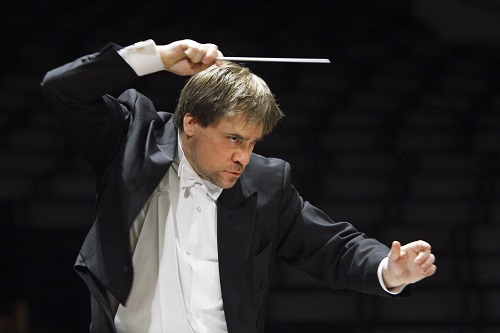 United Kingdom Nielsen, Maxwell Davies, Shostakovich: Håkan Hardenberger (trumpet), BBC Philharmonic Orchestra/John Storgårds (conductor), Bridgewater Hall, Manchester, Saturday 22.10.2016. (MC)
United Kingdom Nielsen, Maxwell Davies, Shostakovich: Håkan Hardenberger (trumpet), BBC Philharmonic Orchestra/John Storgårds (conductor), Bridgewater Hall, Manchester, Saturday 22.10.2016. (MC)

Nielsen – Maskarade, overture (1904/06)
Maxwell Davies – Trumpet Concerto (1988)
Shostakovich – Symphony No. 10 (1953)
Making his welcome first visit of the season to the Bridgewater John Storgårds, principal guest conductor of the BBC Philharmonic, is producing a legacy of memorable performances. In recent seasons I can recall reporting from stunning performances of Shostakovich Fourth Symphony, Vaughan Williams Sixth Symphony and the cycle of complete Nielsen Symphonies.
Tonight’s programme appealed mainly for the Shostakovich Symphony No. 10 and the Maxwell Davies Trumpet Concerto and opened the conventional way with an overture. Since its première in 1906 Nielsen’s comedy opera Maskarade, concerning a young couple Leander and Leonora who meet at a masked ball, is regarded as Denmark’s national opera. With all the composer’s trademark precision and directness of writing the Maskarade overture is a buoyant work with melodies taking surprising turns to its conclusion. Despite Storgårds’ ebullient mood and some fine playing in truth the work doesn’t live up to its promise and I was left wanting something more substantial.
The BBC Philharmonic Orchestra have a firm tradition of playing the music of Peter Maxwell Davies and I recall attending the première of the Third Symphony given by the orchestra under Edward Downes at the Free Trade Hall in 1985 – a score commissioned by the BBC Philharmonic. Played here by renowned soloist Håkan Hardenberger Maxwell Davies’ Trumpet Concerto written a few years later in 1988 inhabits a similar sound world to the Third Symphony evoking a seascape of the notorious Pentland Firth from the composer’s isolated croft on the Orkney island of Hoy and the cliff tops laden with nesting seabirds. Maxwell Davies saw the trumpet part representing the voice of St. Francis of Assisi no doubt during a sermon. Hardenberger knows the taxing demands of this work coping well with the amorphous writing including profusion of sighing motifs and the downward swoops no doubt representing the seabirds. The challenging writing, not without its longueurs, ensures that soloist and orchestra are at odds with each other and Storgårds and Hardenberger had to work together extremely closely. Hardenberger is a professor at Malmö Conservatoire so I’m not sure how frequently he now plays in concert but his tone sounded impeccable.
Shostakovich’s Tenth Symphony, the main work of the evening, I last heard at the Bridgewater as recently as 2014 with Yuri Temirkanov conducting the St. Petersburg Philharmonic Orchestra. I’m old enough to remember when Shostakovich’s symphonies were rarely encountered in the concert hall, now they are almost as common as Beethoven symphonies. The Tenth Symphony was written in the months following the death of Joseph Stalin the leader of the Soviet Union and a few years after the anti-formalist purges of 1948 which must have still stung. It’s said that the Allegro movement is a portrait in music of Stalin and the symphony as a whole seems to be a biting response to the condemnation the composer had suffered. Recently conductor Valery Gergiev stated, “With the Tenth Symphony Shostakovich was finally speaking about Shostakovich.”
John Storgårds had full measure of the shape and pacing of the score in a persuasive, expressive and intensely resolute performance revealing much vivid detail which is often obscured. Making a powerful emotional impression the opening movement Moderato communicated a scene of a cold inhospitable land laid to waste. Emphatically condemnatory the main climax was stunning for its sustained weight and raw power. I especially admired the tension filled Allegro which contrasted savagery and menace with sardonic jubilance. Always intriguing, the Allegretto movement felt like a haunted ballroom with some chilling sounds that were often folk-like and at other times militaristic. There is also the interweaving of the persistent mottos of Shostakovich’s DSCH and the five note Elmira motif. The chorus of horns played wonderfully and considerable praise is due to the principal horn for his exquisite playing. After maintaining such a tremendous level of concentration and intensity for just over an hour the Philharmonic must have been shattered, but it didn’t affect the quality of the playing which was convincing right up to the final bars. Storgårds’ performance took the audience on an uncompromising journey that was both emotional and engagingly dramatic. Standing out the woodwind section is one of the finest in the country. The tone of low strings is in general frequently diminished in the Bridgewater acoustic but the BBC Philharmonic cellos and basses well carried through the hall and sounded richly sonorous in a way I have come to expect characteristically from Russian orchestras.
Michael Cookson
The Concert was being recorded by BBC Radio 3 for future broadcast.